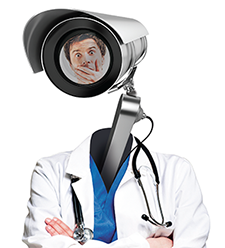
Explore This Issue
ACEP Now: Vol 34 – No 05 – May 2015Image Credit: ILLUSTRATION/PAUL JUESTRICH; PHOTOs shutterstock.com
Two fundamental pillars of the Hippocratic Oath have been attacked, not by politicians or faceless bureaucrats but by our own specialty’s leaders.
Jeremy Brown, MD, director of the Office of Emergency Care Research at the National Institutes of Health, recently wrote that not only should police be using body cameras but that “these devices should also be worn by health care providers.” Police, of course, have a job that constantly involves legal issues and a high potential for violence; our job doesn’t.
Dr. Brown goes on to claim that wearing “med-cams” would have “a civilizing effect” on patient-physician interactions, decrease lawsuits, and reduce violence in EDs. These assertions are so patently ridiculous that he must use hypotheticals, tangential and off-topic research (colonoscopy?), and rare events (significant violence against clinicians) to justify them. His attempt to head off any criticism is likewise ill-advised, comparing any would-be opponents of this technology’s use in the ED to those who ridiculed the stethoscope’s early adopters.1 Actually, the analogous group is those who oppose warrantless wiretapping.
In the second article in the series, Judith Tintinalli, MD, MS, FACEP, professor and chair emeritus of emergency medicine at the University of North Carolina at Chapel Hill School of Medicine, argued that body cameras on medical personnel would provide objectivity to tumultuous ED situations, but in so doing, she actually illuminated the argument against the use by describing it as “a sort of enhanced photojournalism.”2 We have already seen the negative repercussions of the media violating patient privacy and confidentiality while filming resuscitations without permission. In another accompanying article, Nicholas Genes, MD, PhD, assistant professor of emergency medicine at Icahn School of Medicine at Mount Sinai in New York, provided a measure of realism. He noted this procedure’s noncompliance with HIPAA, the tempting target it would make for hackers, the large number of system failures in tests of these systems, and the enormous number of patients who refuse (if asked) to have a video taken. He seems to imply, however, that physicians may soon push for this “panopticon” technology with natural language-processing algorithms (speech recognition) so that they can not only record patient-clinician interactions but also provide billing documentation.3 Note that “panopticon” means an area where everything is visible. Is that what our patients want or will tolerate?
Obviously, George Orwell’s prescient novel 1984, which described Big Brother watching everyone, did not teach its lesson. While our society increasingly relies on seemingly omnipresent security cameras and government surveillance, that level of invasiveness has not yet routinely entered the clinical examination room. Where possible, this preserves patient privacy and, generally, confidentiality. Of all the elements of the venerated Hippocratic Oath, these are the two elements that have persisted as bedrock values for medical encounters. As described in the Oath:
“Into as many houses as I may enter, I will go for the benefit from all voluntary and destructive injustice…About whatever I may see or hear in treatment, or even without treatment, in the life of human beings—things that should not ever be blurted out outside—I will remain silent, holding such things to be unutterable [sacred, not to be divulged].”4
This distinction between public and private information has been not only integral to the practice of medicine but also fundamental to the idea of democracy.4 Patients’ knowledge that physicians, including emergency physicians, will maintain their privacy and confidentiality allows them the liberty to divulge any truths necessary to obtain a diagnosis and provide treatment. It is this confidence that gives physicians the enormous latitude to break otherwise strict societal taboos on asking sensitive questions and touching, sometimes intimately, strangers. It is ironic that Dr. Brown previously stated that one of his “other challenge(s) is to educate the emergency and critical care researcher community about the law of unintended consequences and how it’s very easy to call for a change without realizing that it could bring about the very opposite effect.”5
So what would be the unintended, but clearly seen, consequences resulting from universal emergency physician body cam use or even unconcealed audio-video surveillance throughout the ED? I posit that it would decrease open physician-patient dialogue, decrease the number of patients voluntarily coming to the ED, and increase lawsuits involving the ED for both valid and spurious reasons.
Clinicians’ maintenance of patient privacy and confidentiality has elevated the physician-patient relationship to a special status within our social structure and, much more than the wonders of modern science, has given physicians their esteemed status.
The recent advocacy for emergency physicians to don body cameras to take videos of the most private interactions between themselves and their patients—by specialty leaders, no less—raises an awful stink. That stench signals that we are in danger of crossing substantive ethical barriers. Hopefully, Hippocrates will not need to roll over in his grave but smile from above at our maintaining the essence of his Oath.
Dr. Iserson is professor emeritus of emergency medicine at The University of Arizona in Tucson.
References
- Brown J. The case for body cameras: good for doctors–and their patients. Emergency Physicians Monthly. March 11, 2015.
- Tintinalli J. The invisible gorilla: are doctors ready to have their professional lives on display? Emergency Physicians Monthly. March 13, 2015.
- Genes N. By the numbers: are med-cams financially and technically feasible? Emergency Physicians Monthly. March 12, 2015.
- Miles SH. The Hippocratic oath and the ethics of medicine. New York, N.Y.: Oxford University Press; 2005.
- Annals Q&A with Dr. Jeremy Brown. Ann Emerg Med. 2014;63(1):A13-A15.
Pages: 1 2 3 | Multi-Page




No Responses to “Opinion: Body Cams Could Compromise Physician-Patient Relationship”